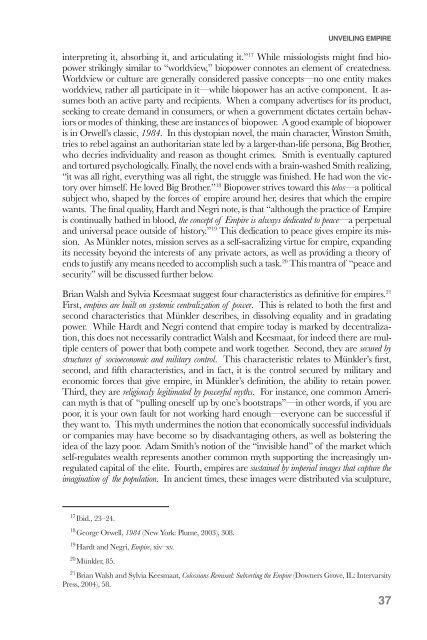VULNERABLE MISSION
VULNERABLE MISSION
VULNERABLE MISSION
You also want an ePaper? Increase the reach of your titles
YUMPU automatically turns print PDFs into web optimized ePapers that Google loves.
UNVEILING EMPIRE<br />
interpreting it, absorbing it, and articulating it.” 17 While missiologists might find biopower<br />
strikingly similar to “worldview,” biopower connotes an element of createdness.<br />
Worldview or culture are generally considered passive concepts—no one entity makes<br />
worldview, rather all participate in it—while biopower has an active component. It assumes<br />
both an active party and recipients. When a company advertises for its product,<br />
seeking to create demand in consumers, or when a government dictates certain behaviors<br />
or modes of thinking, these are instances of biopower. A good example of biopower<br />
is in Orwell’s classic, 1984. In this dystopian novel, the main character, Winston Smith,<br />
tries to rebel against an authoritarian state led by a larger-than-life persona, Big Brother,<br />
who decries individuality and reason as thought crimes. Smith is eventually captured<br />
and tortured psychologically. Finally, the novel ends with a brain-washed Smith realizing,<br />
“it was all right, everything was all right, the struggle was finished. He had won the victory<br />
over himself. He loved Big Brother.” 18 Biopower strives toward this telos—a political<br />
subject who, shaped by the forces of empire around her, desires that which the empire<br />
wants. The final quality, Hardt and Negri note, is that “although the practice of Empire<br />
is continually bathed in blood, the concept of Empire is always dedicated to peace—a perpetual<br />
and universal peace outside of history.” 19 This dedication to peace gives empire its mission.<br />
As Münkler notes, mission serves as a self-sacralizing virtue for empire, expanding<br />
its necessity beyond the interests of any private actors, as well as providing a theory of<br />
ends to justify any means needed to accomplish such a task. 20 This mantra of “peace and<br />
security” will be discussed further below.<br />
Brian Walsh and Sylvia Keesmaat suggest four characteristics as definitive for empires. 21<br />
First, empires are built on systemic centralization of power. This is related to both the first and<br />
second characteristics that Münkler describes, in dissolving equality and in gradating<br />
power. While Hardt and Negri contend that empire today is marked by decentralization,<br />
this does not necessarily contradict Walsh and Keesmaat, for indeed there are multiple<br />
centers of power that both compete and work together. Second, they are secured by<br />
structures of socioeconomic and military control. This characteristic relates to Münkler’s first,<br />
second, and fifth characteristics, and in fact, it is the control secured by military and<br />
economic forces that give empire, in Münkler’s definition, the ability to retain power.<br />
Third, they are religiously legitimated by powerful myths. For instance, one common American<br />
myth is that of “pulling oneself up by one’s bootstraps”—in other words, if you are<br />
poor, it is your own fault for not working hard enough—everyone can be successful if<br />
they want to. This myth undermines the notion that economically successful individuals<br />
or companies may have become so by disadvantaging others, as well as bolstering the<br />
idea of the lazy poor. Adam Smith’s notion of the “invisible hand” of the market which<br />
self-regulates wealth represents another common myth supporting the increasingly unregulated<br />
capital of the elite. Fourth, empires are sustained by imperial images that capture the<br />
imagination of the population. In ancient times, these images were distributed via sculpture,<br />
17 Ibid., 23–24.<br />
18 George Orwell, 1984 (New York: Plume, 2003), 308.<br />
19 Hardt and Negri, Empire, xiv–xv.<br />
20 Münkler, 85.<br />
21 Brian Walsh and Sylvia Keesmaat, Colossians Remixed: Subverting the Empire (Downers Grove, IL: Intervarsity<br />
Press, 2004), 58.<br />
37


